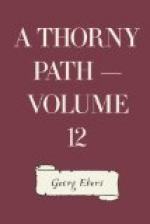“A small Phoenician vessel stole out just before sundown between our guard-ships,” was the reply. “Curse it!” broke from Caesar’s lips in a loud voice, and, after a brief dialogue in an undertone with the prefect, he desired to have papyrus and writing materials brought to him. He himself must inform the senate of what had occurred, and he did so in a few words.
He did not know the number of the slain, and he did not think it worth while to make a rough estimate. All the Alexandrians, he said, had in fact merited death. A swift trireme was to carry the letter to Ostia at daybreak.
He did not, indeed, ask the opinion of the senate, and yet he felt that it would be better that news of the day’s events should reach the curia under his own hand than through the distorting medium of rumor.
Nor did Macrinus impress on him, as usual, that he should give his dispatch a respectful form. This crime, if anything, might help him to the fulfillment of the Magian’s prophecy.
As Caesar was rolling up his missive, the long-expected Zminis came into the room. He had attired himself splendidly, and bore the insignia of his new office. He humbly begged to be pardoned for his long delay. He had had to make his outer man fit to appear among Caesar’s guests, for— as he boastfully explained—he himself had waded in blood, and in the court-yard of the Museum the red life-juice of the Alexandrians had reached above his horse’s knees. The number of the dead, he declared with sickening pride, was above a hundred thousand, as estimated by the prefect.
“Then we will call it eleven myriad,” Caracalla broke in. “Now, we have had enough of the dead. Bring in the living.”
“Whom?” asked the Egyptian, in surprise. Hereupon Caesar’s eyelids began to quiver, and in a threatening tone he reminded his bloody-handed tool of those whom he had ordered him to take alive. Still Zminis was silent, and Caesar furiously shrieked his demand as to whether by his blundering Heron’s daughter had escaped; whether he could not produce the gem-cutter and his son. The blood-stained butcher then perceived that Caesar’s murderous sword might be turned against him also. Still, he was prepared to defend himself by every means in his power. His brain was inventive, and, seeing that the fault for which he would least easily be forgiven was the failure to capture Melissa, he tried to screen himself by a lie. Relying on an incident which he himself had witnessed, he began: “I felt certain of securing the gem-cutter’s pretty daughter, for my men had surrounded his house. But it had come to the ears of these Alexandrian scoundrels that a son of Heron’s, a painter, and his sister, had betrayed their fellow-citizens and excited your wrath. It was to them that they ascribed the punishment which I executed upon them in your name. This rabble have no notion of reflection; before we could hinder them they had rushed on the innocent dwelling. They flung fire-brands into it, burned it, and tore it down. Any one who was within perished, and thus the daughter of Heron died. That is, unfortunately, proved. I can take the old man and his son tomorrow. To-day I have had so much to do that there has not been time to bind the sheaves. It is said that they had escaped before the mob rushed on the house.”




